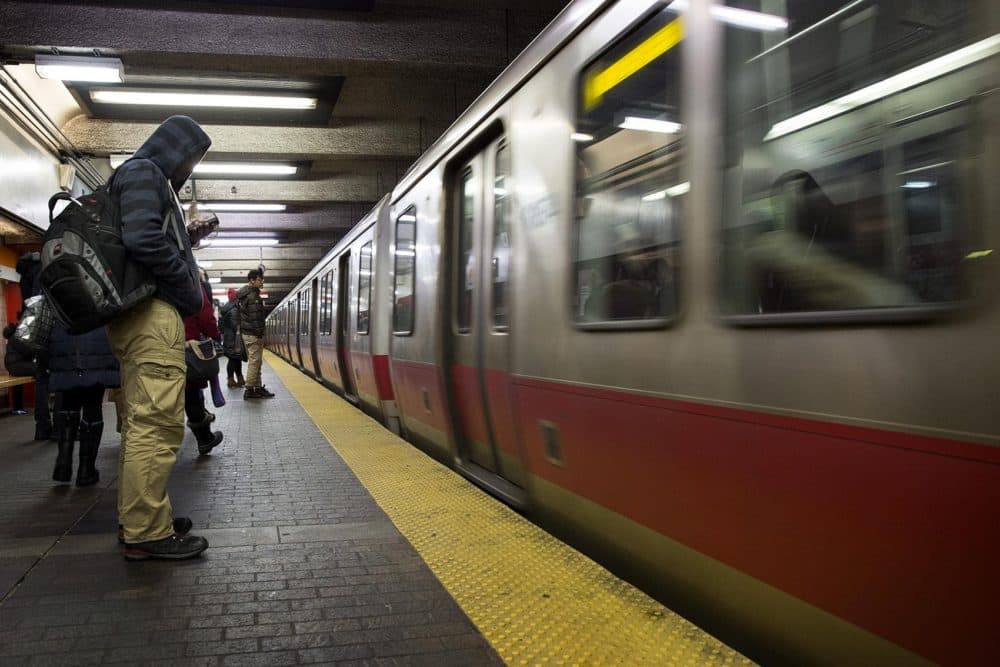Advertisement
Debate Over New Funding For MBTA 'Can't Wait,' Advisory Board Member Says

Although the MBTA's Fiscal and Management Control Board unanimously approved a $2.1 billion budget Monday, members renewed calls for new forms of transportation revenue, after warnings from an outside review group about the T's finances.
The fiscal year 2020 budget passed 5-0 at Monday's meeting and now goes to the Advisory Board, a separate entity representing the interests of communities served by the transit system, although no further action is necessary. Compared to a preliminary version, the final budget — which includes rail and ferry fare increases set to take effect on July 1 — adds $9 million in new spending on station cleaning and hires, but does not reduce the structural deficit.
Much of the conversation at the meeting focused on the years ahead and the growing challenges the MBTA faces. The Advisory Board concluded that the time has come for change and that MBTA leaders must become involved in advocating for legislation that would bring in additional dollars.
"There's a fundamental flaw in the way the MBTA is financed," Paul Regan, executive director of the Advisory Board, told the FMCB. "Rather than admit that, everybody concerned with transit funding has focused on how the T manages the dollars it has rather than how many dollars the T has. I think it's time for us to step away from that."
"We can't wait another year to have this debate. We certainly can't wait until the chickens come home and the MBTA has no more money to operate."
Paul Regan, executive director of the MBTA Advisory Board
Regan's idea would build on Gov. Charlie Baker's proposal to fund climate-resiliency programs through an increase in the real-estate transfer tax. By further increasing the tax from Baker's proposed 0.66 percent to an even 1 percent, Regan said, the state could bring in another $200 million per year and use it for transportation purposes without a significant burden on the public.
He suggested $60 million of that money could go to regional transit authorities, leaving $140 million annually to supplement the MBTA's operations and break free from a decades-long "cycle of operational deficits."
"We have to have this debate now," Regan said. "We can't wait another year to have this debate. We certainly can't wait until the chickens come home and the MBTA has no more money to operate."
The comments reinforced what has become a regular conversation in transportation circles about the challenges of improving service and maintaining infrastructure. When the oversight board debated the forthcoming set of fare increases, several lawmakers and other officials opposed the fare plan, demanding instead the combination of a higher gas tax, increased fees on rideshare companies or a congestion-pricing system to bring in new revenue.
A handful of voices on the FMCB itself even expressed interest in those ideas, both during the fare-increase debate and during Monday's budget discussion. Member Brian Lang said the board needed to support "bolder" action than lawmakers have so far, and he applauded Regan for the suggestion.
"Fare increases [are what] everybody wants to focus on," Lang told reporters after the meeting. "We've got people from the Legislature coming up here pounding their chests about 'don't put it on the riders,' and it gives us an opportunity to say, 'Great, what about some of these proposals people have been raising that we don't have any control over?'"
Lang said after the meeting that FMCB members were in conversations about possibly sending a joint statement to the Legislature calling for action as a way of putting "pressure" on those in office.
He was not alone. Monica Tibbits-Nutt, the board's vice chair, said she believes it is important for members to use the recent debate about transportation funding as momentum to achieve change.
"If we do not do something or send some message for the board or have some next step on this, the second we pass this budget, it's done, and that will be the last chance this board has to do the right thing," Tibbits-Nutt said. "We can't just have another report saying what we need to do and doing nothing about it."
The final budget approved Monday has a $36.5 million structural deficit. A preliminary version considered last month would have reduced that by about a third, but a handful of changes aimed at improving customer accommodations ran the projected deficit back up to its current level.
About $9.4 million in new spending was added, and that money will go to expanded station cleaning, addressing a staffing lag and hiring six new Green Line operators to help reduce delays between trains.
The budget also formalizes a set of fare hikes debated and initially approved earlier this spring. Those hikes, which increase the costs of rail and ferry rides by an average of 5.8 percent, will bring in about $29.5 million in new revenue each year. Bus fares will not be affected as part of a compromise made by the board.